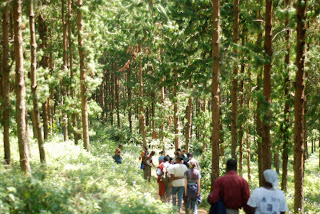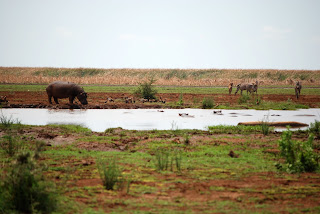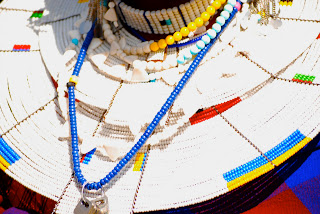My music paper on the Maasai people and music
In a world that is constantly changing, culture is constantly being lost. This is a sad, but true fact that is being faced by many third world countries. Due to lack of education and lack of writing abilities, traditions are rapidly becoming unknown and unappreciated. Due to the generations dying off, culture and song and dance are also dying. As the middle generation has had an education and is now finding modern jobs, culture and heritage are being left by the way side. However, this current generation of youth are experiencing the most culture drain due to modernized schooling which takes the child out of the family influence and home life, leaving the stories and songs that are usually taught in childhood. These reasons combined are the reasons why music is so vital to the preservation of the Maasai history.
The Maasai people are some of the most well known people of Africa because of their ferocity and warrior lifestyle. Maasai is an ethnic group of East Africa which has about 22 tribes inside the Maasai sect all speaking the Maa language (Mashauri). Before the European invasion into Africa, Maasai were all nomadic, living where their cattle lived. At first the Europeans feared the Maasai until the Europeans decided they wanted the fertile land in the Northern part of Kenya that was Maasai controlled . A civil war broke out and due to the severe lack of Maasai deaths from disease, they were relocated to different terrain and reservations. This agreement was called the 1904 Maasai Agreement which reduced their territory by two thirds (Finke). Since the Agreement, Maasai people still continue to be allocated to certain areas and are still losing land. The loss of land and increase in National parks is causing the Maasai to become permanent beings, which also allows them to receive a permanent education but makes raising livestock a harder challenge. Since Tanzania’s independence, villagazation has been promoted to encourage tribes to settle down and become bomas existing of multiple families (Kitumusote).
Maasai are very respectful of elders and warriors. Therefore, specific age sets for men are representative of the respect or lack of respect that should be given to the males in the community. Each age set is about 15 years wide and comprised of all the boys that were born during that 15 year period. Children in the Maasai culture are viewed with having responsibility. Often times, children as young as four or five are in charge of a herd of sheep or goats. As the child matures, or proves himself, he will be in charge of more animals. Boy’s do not have any rights to decoration or marriage until after circumcision and initiation.Moran (singular) or Morani (plural) are the warriors who are the most respected of the community. Morani are the traditional “physical guardians of Maasai society” who are in charge of fighting other tribes, guard cattle, and search for new pastures (Finke). There are three periods of warrior hood including Sipoli, newly circumcised; Ol Murrani Barnot, junior warriors; and Ol Murrani Botor, the senior warriors (Finke). Once a man has reached Ol Murrani Botor, he is allowed to go home to marry and start a family.
There is importance behind the tools of the people as well. Sticks are used by both women and men. The sticks used by the women are called esiteti and the men’s are called ilmeleleke or rungu which are hard, black wood stick which is carried everywhere that the Moran goes which is used as a weapon or tool for herding animals (Mashauri). The ilmeleleke is very symbolic and representative of life and feelings and “represent’s a man’s life itself” (Mashauri). The age of the man depends on where the rungu is being held. Moran’s hold the ilmeleleke at the head where it has been “circumcised” and is clean. The elder’s hold the stick in the middle and the children at the bottom where it has been in the dirt because it has been in the ground representing the uncleanliness from uncircumcision. Elder’s are men who are past senior warrior hood. There are many stages in elder hood, but there is no centralized authority. The elder’s make decisions together and rarely are those decisions challenged by the younger generations (Finke). Also, Morani can show their feelings through the use of their ilmeleleke. If a Moran enters into the boma with the rangu across his shoulders and his arms hanging across, he is telling everyone he is tired and will not be sleeping with any of his wives that night. Similarly if he comes in and sits down and places the ilmeleleke horizontally in front of his knee and applies pressure to the middle of the stick using his knee, he is informing everyone that he is hungry. The ilmeleleke is used not only for practical use, but also has an unspoken language behind it.
Like all traditional music of East Africa, Maasai music has a purpose and is based off tradition. Maasai music involves no use of drums or “instruments” although the voice, body, and jewelry is considered as an instrument. Occasionally horns from the cudu will also be used as a supplemental instrument (Mashauri). The reason Maasai do not use drums is because they believe to have a “better” use of the cow hide such as clothing. Hezron Mashauri, Waarusha Maasai and graduate in Music from MakumiraMaasai comes from engululu’s and grunt’s. An englulu is a high pitched yell for excitement from a woman. Grunt’s serve as the women which are deep noises coming only from the men. They are something that Mashuari says, “just comes on performance, not something that is fixed to be there. If you get excited, then you can apply it.” Together these two noises make up for the use of drums and give Maasai music a specific sound. The purpose behind the music and dancing is enjoyment. This is the way to express feelings and emotion. Music allows the hard life of the Maasai people, especially those who are herders, because it removes loneliness. “You are not alone if you are only with cows but have music. Music is somebody that you need to be together. [With music] you are not alone” (Mashauri).
Because of the gaps in the generational pass down of traditions, music plays a large role in preserving the original language of Maa. Music is sometimes the only way in which certain traditions have survived due to the lack of any written traditions. Songs and chants often preserve the knowledge of traditional medicine, information about herding animals, gathering wild food, and the type of land Maasai live on (Kitumusote). Maasai music retains the music, traditions, and dance through singing and telling of stories that have been passed down over the many generations, since the beginning of the Maasai culture.
Music including singing and dancing is not just for special occasions, but also for the every day life of the Maasai people. Music ceremonies lasting for boy’s circumcision shows community amongst the people. These are often some of the biggest celebrations because they only happen every seven to fifteen years and symbolize the most important transition in a boy’s life. Similarly, as a child is born, the mother or community will sing for the child to calm it down when upset. However, as the child grows older and becomes more independent, the child is then responsible for singing to himself to calm himself down (Helena). Because a large part of the Maasai life is based around cattle, even the cattle play a role in music. Three women Naisho, Helena, and Ngoilelo are Maasai wives and mothers from Engutukoiti Kijiji area outside Arusha, Tanzania who say a song is sang for the cattle each night as to calm them down and bring them inside the boma without having to use extra energy. Songs are also used by the boys and men who are out with the cattle each day. They believe that by singing songs and chanting, wild and threatening animals will be scared away from their herds. Although the music exists on a daily basis, it is only for special occasions and church that the women wear the wide necklaces. When the topic of these necklaces came up, the women became very proud and wanted to show off their beauties.
Music is obviously used for many different purposes in both every day life and the special celebrations that occur. Often times, music is used as a gathering call to the neighboring bomas. “For example when baby boy is born they apply Engululu 3 times so everyone knows a baby boy is somewhere. So then people come and find the baby and have a party. For a girl it is 4 times” (Mashauri). On the opposite end, “When men die in Waarusha, it is 3 days of solemn for men, 4 days for women. When person dies in Maasai there is no music, it is a time when everyone is silent. You can say it is a type of music, to be silent” (Mashauri). Music is used during these instances to show the community the celebration of a new life along with the mourning of a death.
Also, music is used in celebration, not just to invite people, but also to show emotion. Ngoilelo and her son, Ndoipo who is her firstborn and acts as the father of the boma because Ngoilelo’s husband has many wives with many bomas. They live in a boma with Ndoipo’s three younger sisters and new wife with circular homes made from mud, sticks, and a coating of animal dung. These homes can last up to more than 10 years if taken care of properly. The walls are similar to cork board in the sense that knives and pointed objects can be held by being stuck in the wall. At Ndoipo’s wedding celebration, many people came bringing animals as gifts for the new couple. The celebrations lasted for almost seven days with many people coming from all over. Wedding songs are traditional and ceremonial. However, they never mention the word wedding or the names of either party. One song can last many hours with different variations placed inside. When asked if they became tired after such a long song, Ngolilelo’s answer was “you cannot get tired when you are excited!”
Due to the challenging nature of the Maasai lifestyle from being displaced on “their” land to constant movement and travel with out much food, some kind of escape from the hardships of life is needed. That escape has proven to show itself as music and dance which bring happiness and excitement along with helping to preserve the cultural history. Music is the key to the pass down of culture through the generations as today’s generation is missing out on so much of the cultural experience that comes during the early years. Music helps define each part of the life of the Maasai people along with retaining Maa and symbolic representing major events. Music also acts as an invitation to the other’s in the community as they are able to hear music and singing or engululus and know what has occurred in the boma nearby. The Maasai life is very symbolic itself through the importance of the different age sets and role of men and women. Similarly, music will never cease to keep the Maasai culture intact.
Works Cited
Finke, Jens. "Maasai Culture." Blue Gecko. Jens Finke, 2007. Web. 06 May 2011. <http:// www.bluegecko.org/kenya/tribes/maasai/history.htm>.
Helena. Personal Interview by Catherine Bean. May 8, 2011. 10 May 2011.
Kitumusote, . "History of Maasai." Kitumusote. N.p., 2006. Web. 07 May 2011. <http:// www.kitumusote.org/history>
Mashauri, Hezron. Personal Interview by Catherine Bean. May 5, 2011.
Naisho. Personal Interview by Catherine Bean. May 8, 2011.
Ngoilelo. Personal Interview by Catherine Bean. May 8, 2011.



























































